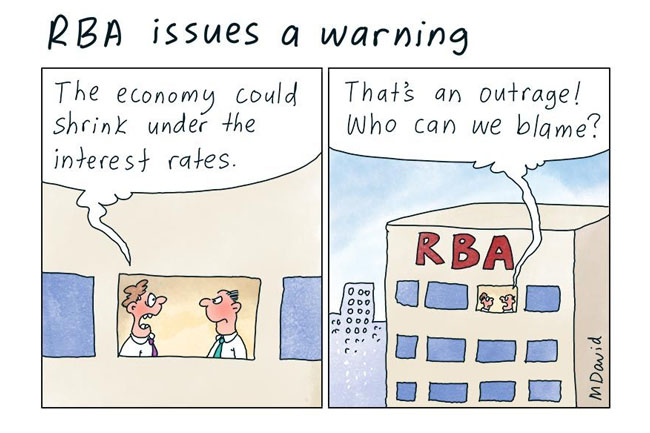The Turnbull Government's recent budget cuts and half-hearted attempts at innovation reveal a systemic pattern of taking from the poor only to assist big business interests, says John Haly.
CHRISTMAS IS A time of goodwill and charity. Parliament closes down for the year and one assumes that political machinations also take a break.
But those who have kept their eye on the Liberal Party’s agenda were surprised to discover activity in the making.
The Liberal Party’s ideals of charity and goodwill for Christmas appear to have taken a turn against our collective good. Perhaps, they thought we weren’t looking.
Tourism in Australia is eclipsing mining as a source of revenue. As real commodity prices continue to drop – as they have since 2011 – and expectations in an international environment are committed to a reduction in coal usage, hope for a return to commodity price booms are diminishing year by year.
The mining industry now employs less than two per cent of the workforce and continues its diminishing returns to the gross domestic product (GDP). Mining, in fact, contributed nothing to economic growth in the December 2014 quarter — dropping from 5.6 per cent in six months.
It would appear to be an unusual and short-sighted resolution to approve a massive expansion of the Abbot Point coal terminal, given that such a conclusion will result in destruction of our coral reefs – a major attraction for tourism in this region – how does trashing tourism and favouring mining make for an economically sustainable decision?
Working penalties
Christmas was also the time that Productivity Commission Inquiry Report into workplace relations was released. Among its recommendations, the slashing of Sunday penalty rates confirmed the inclination to revoke these rights — a long running preoccupation of the Liberal Party. Employment Minister Michaelia Cash, criticised Labor and the unions for “scaremongering” on the subject. Despite attempts to relegate the report to an arena of objective non-governmental decision-making, it is surprisingly aligned with the conversations about revoking penalties by members of the Liberal Party.
The majority of Australian workplaces (85.1 per cent of all businesses) are micro businesses with less than five employees. The savings from penalty reductions would not be enough to fund employment of additional staff. Under the productivity commission report proposal, a business would save itself a quarter of the hourly rate on a Sunday (double time on Sunday reduced to 1.5 times hourly rate).
Turnbull Gov cuts to services before Christmas =$1.7 billion from aged care and health While big corps get handouts pic.twitter.com/OsbEeOQXnc
— Paul A (@PyeAlpha) December 27, 2015
A business would need to be employing at least a dozen employees so that penalty rate reductions could fund an additional full-time employee. This varies depending on the mix of days staff may be employed in a business. Small businesses that employ five to 19 people represent 10.8 per cent of Australian businesses. Small to medium sized businesses provide 70 per cent of private sector employment in Australia. The argument that this is beneficial simultaneously for micro to small businesses and employment rates, is simply not true for the vast majority of Australian workplaces.
It is only the larger industries (0.3 per cent of businesses) and medium sized industries (3.8 per cent) which employ more than 20 people in their enterprise that may possibly find significant enough savings to afford to make a change to unemployment in this country — providing they were so willing. When employment in larger industries such as mining, manufacturing and construction is actually diminishing, consumer confidence is low, retail sales data shows diminishing returns and wage growth is already small, why exactly would large businesses hire more?
There is, in fact, little evidence that changing penalty rates will do anything to change employment rates. Essentially revoking penalty rates is a huge wage cut for many already poorly paid workers. Penalty rate reductions do provide a boost to large company’s bottom line. Many of these corporate organisations channel profits overseas and pay no tax (or very little). These companies removing money from our economy partially accounts for a huge national balance of payment inequity.
Communications
The next Christmas present is the one the Government has provided to the privatised Telstra organisation of $80 million. What for? We are apparently paying Telstra to repair the crappy copper network the National Broadband Network (NBN) had already bought from Telstra for $11 billion. Apparently, the ageing copper wires need to be replaced and this was announced on the Monday before Christmas. Merry Christmas Telstra.
We have a history of chronic failure and escalating costs dogging the NBN from its inception. This latest farcical payment is just another reason to despair for us ever becoming technologically competitive.
100 days of PM Turnbull: inept handling of NBN confirmed;party disunity,budget in freefall;Medicare attacked;environment threatened #auspol
— Light on the Hill (@LegacyOfJack) December 22, 2015
Health and education
Economic prosperity for any country can only be enhanced by the health and education of its participants. Undercutting both can only ultimately be detrimental. Two days before Christmas, Minister for Health Sussan Ley announced that 23 tests and procedures formally covered by Medicare would be dropped. Among these tests and procedures – which cost $6.8 million in 2015 – were ear, nose and throat surgery and diagnostic imaging.
These tests and surgeries were accessed over 52,000 times in 2015. Therefore, Sussan Ley’s claim that these items “were obsolete”, does not stack up statistically. The Australian Medical Association has been up in arms over the loss of these items from the Medicare benefits schedule and even Sussan Ley admitted some patients “may be worse off”.
Cut, snip, chop
Prime Minister Malcolm Turnbull's early Christmas contributions from his latest budget efforts included cuts to aged care, health bodies, aged pensions, income support payments, welfare payments, family assistance payments, tax benefits, day care, environmental programs, numerous health programs and a plethora of education and training programs.
These cuts demonstrate the continued failure of the Liberal Government to support the health and education of the Australian people.
On the subject of education, there are now indications the Turnbull Government will not fund the final two years of the Gonski school funding program. Merry Christmas to our children.
Innovation
All of these cuts were implemented to fund a $1 billion innovation package announcement, which was vaguely delivered without real detail. It seems vaguely reminiscent of a similar announcement made by Kevin Rudd in April of 2008 at the Australia 2020 Summit. The irony of that seems to have escaped the Liberal Party despite social media commenting on it incessantly.
Most of this is not provided by way of direct funding but by way of tax cuts and exemptions.
Other encouragements such as shortening bankruptcy periods will most certainly be exploited by unscrupulous individuals to avoid debt repayment and achieve faster returns to business, thereby repeating the process by fleecing another group of undiscerning victims. The large business concerns will, of course, rebrand themselves as “innovators” to take advantage of even more lax tax laws, resulting in even less contribution to the Australian economy.
media over Moon Turnbull leads polls for what this we wouldn't accept these cuts from Labor Media would go Ballistic pic.twitter.com/cAn77buOoe
— Geoff Pearson (@GCobber99) December 29, 2015
This is the Liberal Party’s version of the solar panel and insulation scheme. Failure to attend to detail is something of which both major parties are guilty. That said, it’s not hard to determine who will benefit from Turnbull’s package.
Innovation will only work when supported by:
- technology (strike for the NBN)
- a healthy population (strikes for GP co-payments and medicare reductions),
- an educated community (strikes for industrial skills, Gonski and expensive tertiary education)
and other programs which would support workforce participation in innovation.
Turnbull does correctly realise that Australia’s private sector industries are often too risk-averse to invest in the commercialisation of new technologies and innovations without massive government support. Historically, brilliant Australian innovations are developed and exploited overseas. As it is, Australian businesses frequently outsource technical jobs overseas and bypass local workers, usually for cost related reasons. All of these practices undercut Australian innovation and development.
CSIRO
There is much talk about Turnbull providing an extra $100 million in funding to the CSIRO. This step is not dissimilar to the situation in regards his much-publicised increases to domestic violence funding of $100 million after Tony Abbott had previously cut $300 million and overseen closures of numerous shelters.
It turns out that Abbott cut $111 million in the May budget to CSIRO, resulting in organisation-wide staffing cuts. Twenty per cent of CSIRO’s staff have already gone. Suggesting that CSIRO now has sufficient funding to re-employ these experts is naïve. It overlooks the fact that science is a global labour market and the disengagement that comes from arbitrary retrenchment.
Further, there has been a loss of momentum on resources and time critical projects that have been closed for months. Very much like the domestic violence situation where shelters had already closed and have not been reopened, CSIRO projects have similarly closed.
Again there is a striking similarity of language used by the recipients of funding for domestic violence and the CSIRO, where the term “first step” was used frequently. Projects have already been irrevocably damaged by the loss of intellectual capital provided by long-term researchers. The damage has already been critical and funding a recovery will cost far more than was taken originally.
It is also the case that the funding is tied to certain commercial provisions, so CSIRO is no longer free to return to its original directions even if this was possible. If Turnbull is contributing less than that which was taken, it is simply insufficient to repair damage already incurred. The consequence is that real innovation from an organisation, which has historically delivered numerous technological breakthroughs, has already been lost.
By taking support from the elderly, penalty rates from low income earners, Medicare rebates from the ill, education programs from students, sustainability from the environment, research funding from scientists and tourism from all, unlimited charity and generosity is extended to mining and big business interests. Happy Christmas from the Government.
You can follow John Haly on twitter @halyucinations or on his blog at auswakeup.info.

This work is licensed under a Creative Commons Attribution-NonCommercial-NoDerivs 3.0 Australia License
Turnbully's *innovative* policies add up to tax cuts for rich and corporations and attacks on penalty rates and unions. Is it 2016 or 1916?
— Ethical Martini (@ethicalmartini) January 2, 2016
Monthly Donation
Single Donation
Turnbull Withdraws Gonski Funding So It’s Not Wasted On Children’s Education. https://t.co/5S89lRdb2T pic.twitter.com/PS5hwwSALH
— SBS Comedy (@SBSComedy) January 2, 2016
Keep up. Subscribe to IA for just $5.









